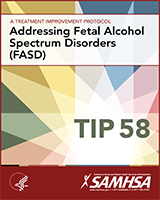NCBI Bookshelf. A service of the National Library of Medicine, National Institutes of Health.
Center for Substance Abuse Prevention (US). Addressing Fetal Alcohol Spectrum Disorders (FASD). Rockville (MD): Substance Abuse and Mental Health Services Administration (US); 2014. (Treatment Improvement Protocol (TIP) Series, No. 58.)
The state of Mississippi has developed operational standards addressing FASD that can potentially help define and inform other state reimbursement systems. The following selected standards are taken from the Mississippi Department of Mental Health's Operational Standards for Mental Health, Intellectual/Developmental Disabilities, and Substance Abuse Community Service Providers, published January 2011.
- XVI.D.1. Fetal alcohol spectrum disorders (FASD) is an umbrella term describing the range of effects that can occur in an individual whose mother drank alcohol during pregnancy. These effects may include physical, mental, behavioral, and/or learning disabilities with possible lifelong implications. Behavioral or cognitive problems may include intellectual disability, learning disabilities, attention deficits, hyperactivity, poor impulse control, and social, language, and memory deficits. FASD occurs in about 1% of all live births, or about 450 to 500 new cases in Mississippi per year. The damage caused by prenatal alcohol exposure is permanent. The effects cannot be reversed, but many of them can be treated with the appropriate combination of interventions and support. Secondary disabilities of FASD include mental health issues (90%), school problems (60%), trouble with the law (60%) and attempted suicide (23%). Early identification and diagnosis of children with an FASD can help ensure appropriate treatment which in turn will help reduce the occurrence and impact of these secondary disabilities.
- XVI.D.2. Children ages birth to age 18 must be screened within six (6) months of Intake to determine if there is a need for a Fetal Alcohol Spectrum Disorders (FASD) diagnostic evaluation. Youth ages 18 to 24 may be screened for an FASD if the provider has reason to believe that there was prenatal alcohol exposure.
- XVI.D.3. The FASD screening tool1 will be provided by the Division of Children and Youth Services (see the DMH Record Guide). The screening may be conducted by a case manager, a therapist, or other children's mental health professional.
- XVI.D.5. Results of the FASD screening and FASD diagnostic evaluations, if indicated, must be reflected in the child's Individual Service Plan and/or Case Management Service 185 Plan. If a child receives a fetal alcohol-related diagnosis, it should be recorded on the appropriate Axis.
- XVI.D.6. If a child's initial FASD screening result is negative and if additional information regarding maternal alcohol history is obtained that might change the results of the initial FASD screen from negative to positive for possible prenatal alcohol exposure, the result of the initial screening must be revised on the FASD Screening Form to reflect this change and a diagnostic evaluation must be sought.
- XVI.D.7. With consent obtained from the parent/legal guardian, children who receive a positive FASD screen should be referred to the Child Development Clinic at the University of Mississippi Medical Center or other multi-disciplinary children's clinic qualified to diagnose FASD for a diagnostic evaluation. With consent obtained from the parent/legal guardian, best practice requires a provider staff person to accompany the child and parent/guardian to the diagnostic appointment in order to participate in the child's history interview and the informational interview. If this best practice is not followed, the child's record must be documented to show the effort put forth by the staff person to attend the diagnostic appointment and the reason this did not occur. A copy of the full diagnostic report must be placed in the child's record.
- XVI.D.8. Treatments and interventions recommended by the FASD multi-disciplinary diagnostic team must be either provided or facilitated by the CMHC. Referral to the local MAP Team should be made when appropriate.
- XVI.D.9. Because children with an FASD often are not able to respond to traditional mental health services and/or treatments, children's mental health services may need to be modified in order to be more effective for children with an FASD. FASD services and service modifications must be documented in the child's record.
Footnotes
- 1
The FASD screening tool referred to in operational standard XVI.D.3 is available on pp. 129-131 of the Department of Mental Health Record Guide for Mental Health, Intellectual and Developmental Disabilities, and Substance Abuse Community Providers, 2012 Revision (http://www
.dmh.state .ms.us/pdf/DMH%20Record %20Guide%202012%20Revision.pdf), published by the Mississippi Department of Mental Health. The tool is less extensive than the FASD 4-Digit Code Caregiver Interview Checklist included in Part 1, Chapter 2 of this TIP, and is intended primarily for use with children (although it is suggested for limited use with individuals ages 18-24).
- Operational Standards for Fetal Alcohol Spectrum Disorders (FASD): A Model - Add...Operational Standards for Fetal Alcohol Spectrum Disorders (FASD): A Model - Addressing Fetal Alcohol Spectrum Disorders (FASD)
- calmodulin, partial [Myxospora sp. YC-2024b]calmodulin, partial [Myxospora sp. YC-2024b]gi|2831517898|gb|XIE10231.1|Protein
- hypothetical protein ACEY16_13645 [Lactiplantibacillus plantarum]hypothetical protein ACEY16_13645 [Lactiplantibacillus plantarum]gi|2807377611|gnl|PRJNA1158703|ACEY 645|gb|XHB67962.1|Protein
- 1,4-alpha-glucan branching protein GlgB [Lactiplantibacillus plantarum]1,4-alpha-glucan branching protein GlgB [Lactiplantibacillus plantarum]gi|2807377621|gnl|PRJNA1158703|ACEY 095|gb|XHB67972.1|Protein
Your browsing activity is empty.
Activity recording is turned off.
See more...
